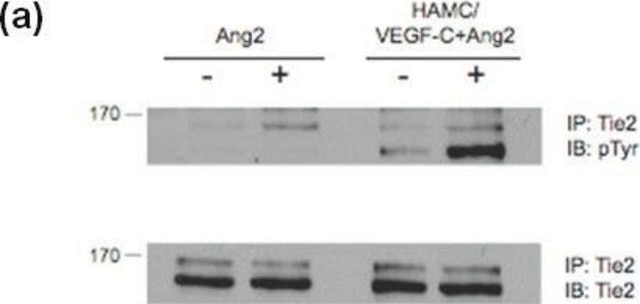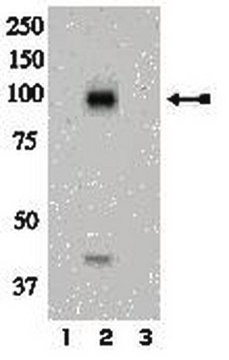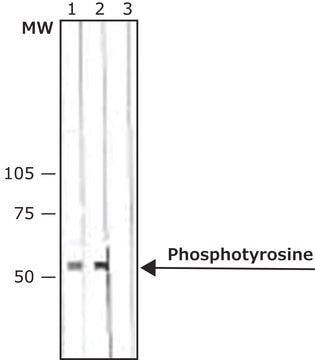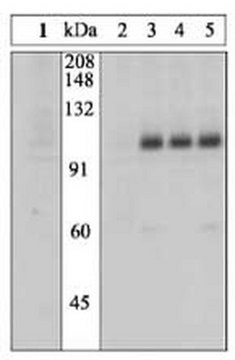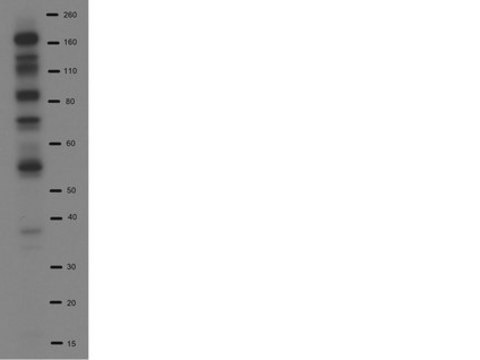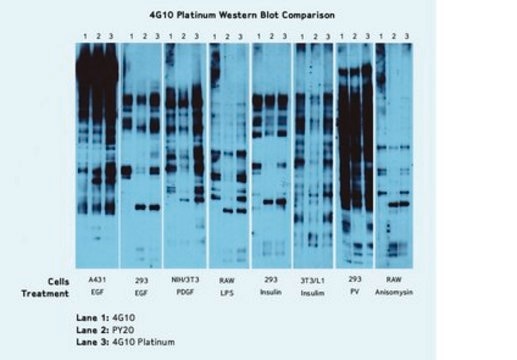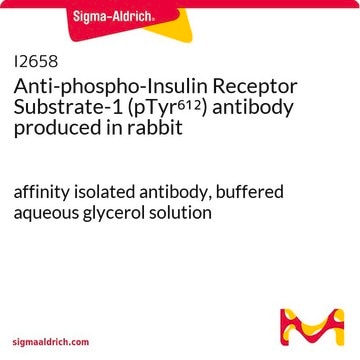04-300
Anti-phospho-Insulin Receptor (Tyr 1322) Antibody, clone 21G12
clone 21g12, Upstate®, from mouse
Synonym(s):
INSR
Sign Into View Organizational & Contract Pricing
All Photos(2)
About This Item
UNSPSC Code:
12352203
eCl@ss:
32160702
NACRES:
NA.41
Recommended Products
biological source
mouse
Quality Level
antibody form
purified antibody
antibody product type
primary antibodies
clone
21g12, monoclonal
species reactivity
canine, human, mouse
manufacturer/tradename
Upstate®
technique(s)
ELISA: suitable
western blot: suitable
isotype
IgG1
NCBI accession no.
UniProt accession no.
shipped in
wet ice
target post-translational modification
phosphorylation (pTyr1322)
Gene Information
human ... INSR(3643)
Specificity
Recognizes phosphorylated domain of Insulin receptor on Tyrosine 1322.
Immunogen
KLH-conjugated synthetic peptide encompassing the surrounding amino acids of Tyrosine 1322 on phosphorylated insulin receptor
Application
Anti-phospho-Insulin Receptor Antibody, clone 21G12 is an antibody against phospho-Insulin Receptor (Tyr 1322) for use in ELISA & WB.
Research Category
Signaling
Signaling
Research Sub Category
Insulin/Energy Signaling
Insulin/Energy Signaling
Quality
Routinely evaluated by immunoblot.
Target description
97 kDa
Physical form
Format: Purified
Lyophilized in 2X PBS containing 0.09% sodium azide, PEG, and sucrose.
Subsequent thiophilic adsorption and size exclusion chromatography
Storage and Stability
2 years at -20°C from date of shipment. Reconstitute prior to use. Reconstitute with 1 mL H2O for 15 min at room temperature. Reconstituted aliquots should be stored frozen at -80°C. Thawed aliquots may be stored at 4°C for up to 3 months. Avoid repeated freeze/thaw cycles, which may damage IgG and affect product performance.
Analysis Note
Control
Includes pervanadate treated HEK293 lysate as a positive control.
Includes pervanadate treated HEK293 lysate as a positive control.
Legal Information
UPSTATE is a registered trademark of Merck KGaA, Darmstadt, Germany
Disclaimer
Unless otherwise stated in our catalog or other company documentation accompanying the product(s), our products are intended for research use only and are not to be used for any other purpose, which includes but is not limited to, unauthorized commercial uses, in vitro diagnostic uses, ex vivo or in vivo therapeutic uses or any type of consumption or application to humans or animals.
Not finding the right product?
Try our Product Selector Tool.
Storage Class
10 - Combustible liquids
Certificates of Analysis (COA)
Search for Certificates of Analysis (COA) by entering the products Lot/Batch Number. Lot and Batch Numbers can be found on a product’s label following the words ‘Lot’ or ‘Batch’.
Already Own This Product?
Find documentation for the products that you have recently purchased in the Document Library.
Molecular cloning of a DNA sequence complementary to creatine kinase M mRNA from chickens.
Schweinfest, CW; Kwiatkowski, RW; Dottin, RP
Proceedings of the National Academy of Sciences of the USA null
Frankie B Stentz et al.
Biochemical and biophysical research communications, 335(2), 491-495 (2005-08-09)
Upon activation by phytohemagglutine (PHA), T-lymphocytes (T-cells) express receptors for growth factors, insulin, IGF-1 and IL2 and become insulin sensitive. Diabetic ketoacidosis (DKA) is associated with in vivo emergence of these growth factor receptors without incubation with PHA. As DKA
Francesca Fiory et al.
Molecular and cellular biology, 25(24), 10803-10814 (2005-11-30)
In L6 myoblasts, insulin receptors with deletion of the C-terminal 43 amino acids (IR(Delta43)) exhibited normal autophosphorylation and IRS-1/2 tyrosine phosphorylation. The L6 cells expressing IR(Delta43) (L6(IRDelta43)) also showed no insulin effect on glucose uptake and glycogen synthase, accompanied by
Template to improve glycemic control without reducing adiposity or dietary fat.
Krishnapuram, R; Dhurandhar, EJ; Dubuisson, O; Kirk-Ballard, H; Bajpeyi, S; Butte et al.
American Journal of Physiology. Endocrinology and Metabolism null
Qiu-yan Wang et al.
The FEBS journal, 274(2), 526-538 (2007-01-19)
Two H7721 human hepatocarcinoma cell lines showing moderate and high expression of alpha1,3-fucosyltransferase (FucT)-VII cDNA were established and designated FucTVII-M and FucTVII-H, respectively. In alpha1,3-FucT-VII-transfected cells, expression of insulin receptor (InR) alpha- and beta subunits and epidermal growth factor receptor
Our team of scientists has experience in all areas of research including Life Science, Material Science, Chemical Synthesis, Chromatography, Analytical and many others.
Contact Technical Service

